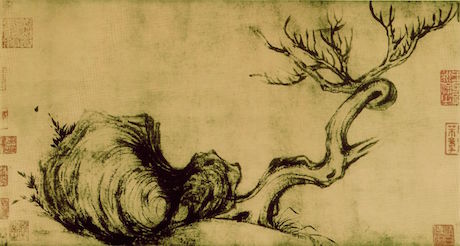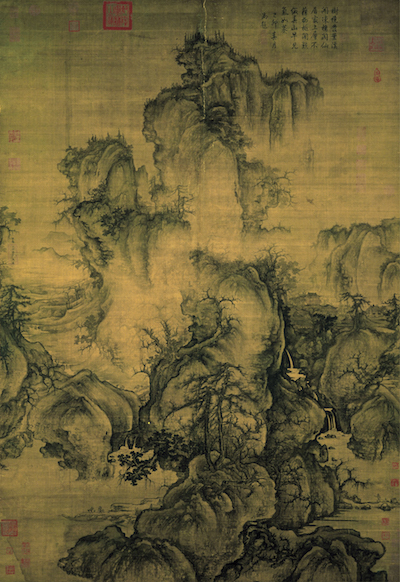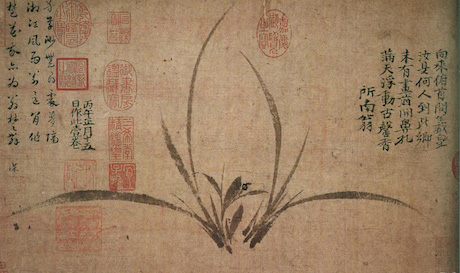Meng’s [Meng Yujian, (active ca. 1325-53)] paintings were popular during his lifetime but critical opinion was not entirely favorable; the T’u-hui pao-chien says of him: “His works are very delicate and pretty, but he cannot avoid an air of skillfulness.” To accuse an artist of being skillful was, of course, to relegate him to a lower rank.
—James Cahill, Hills Beyond a River: Chinese Painting of the Yuan Dynasty
Last summer the Berkeley Art Museum uncharacteristically rotated the Cahill collection out of its set of by-appointment-only cabinets, and I only managed to go see it once. More recently I found myself in a beautiful reading room of the campus Asian studies library, facing thousands of books I couldn’t read; so I went looking for volumes with pictures and got lost in Cahill’s account of the Yuan.
Su Shi, in the Song era, is tagged as the first to have said that “anyone judging painting on the criterion of likeness is the next thing to a child.” He would have been already exiled from court when he said it, without others around to take up the provocation. So he kept going on his own, painting weird rocks and trees:
instead of comprehensible academy landscapes in the Guo Xi manner:
It wasn’t until after the Mongol conquest that Su’s aesthetics were more broadly taken up, because all at once the country’s entire educated class found itself in Su’s position. They couldn’t get jobs at court (and if a job was offered, tended to reject it out of principle); centuries of prejudice against artisans barred them from painting for money. They gathered far from Kublai Khan’s capital, around the lakes of Suzhou, and with Su as a model began to elaborate an intellectually demanding coterie art, aggressively amateurish in technique and defying court and marketplace alike. Looking back from the Ming, the painter-writer Gu Ningyuan wrote that they “were all men of great virtue and succeeded in concealing their technical skill. They were afraid of becoming famous through their painting and of not being able to avoid the entanglements of the world. Only Zhao Mengfu stood out brilliantly and competed with the famous masters of the Tang and Song periods. He was very bold, but when he became a high official, he must nevertheless have found his great skill in art an embarrassment.”
Their works are often compared to primitivist and expressionist movements in Western art, but in this social context they remind me of nothing so much as underground rock—any of those indie or art-punk modes that deploy bluntness and naivete as a code, because only the right people are supposed to get that it’s smarter, and is working much harder, than it seems.
The scholarly class was trained in calligraphy rather than painting, and not only are these new paintings suddenly covered in writing, the forms themselves are written with the calligrapher’s brush. Each leaf and petal of Zheng Sixiao’s orchids records a single stroke, and is thus subject to the performative demands of calligraphy. Every nuance of the hand’s motion is recorded, and can’t be erased or revised once it’s laid down, making for a record of performance as intimate and unsparing as two-track tape. The concept of qiyun (氣韻) had been a touchstone of art criticism for centuries, and had seen many redefinitions; for the Yuan, it meant the signature expression of the artist’s temperament, as opposed to technical skill or verisimilitude. Art books render the term as “spirit resonance” or “spirit consonance,” but surely what we’d call it over here is “soul.” The Yuan take on qiyun is whatever makes two chords on Lou Reed’s guitar Lou Reed chords and nobody else’s; whatever makes a line into a Lou Reed line as soon as he opens his mouth.
The famous story about Zheng’s orchids is that someone asked him why the orchids were rooted in empty space. Where was the earth? “The earth has been stolen by the barbarians,” said Zheng. The painting’s space used to be emptier than it is now—the seals and much of the writing were added by later admirers—but one passage on the left is in Zheng’s own hand. “If you ask me for it, you won’t get it,” he says; “if you don’t ask for it, I might give it to you.” That’s as arch toward its audience as any liner notes I can think of, and quite a familiar gambit of the dispossessed.



